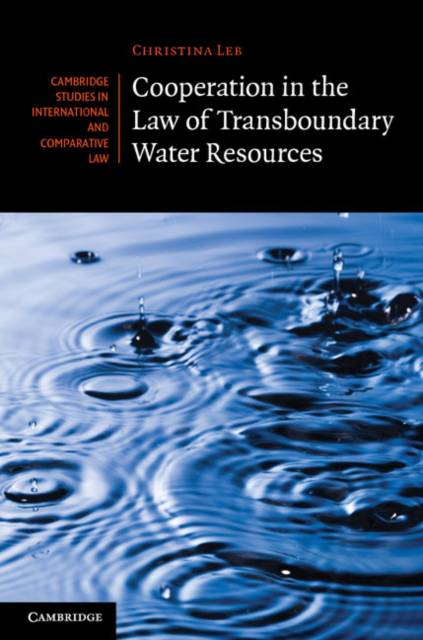
Bedankt voor het vertrouwen het afgelopen jaar! Om jou te bedanken bieden we GRATIS verzending (in België) aan op alles gedurende de hele maand januari.
- Afhalen na 1 uur in een winkel met voorraad
- In januari gratis thuislevering in België
- Ruim aanbod met 7 miljoen producten
Bedankt voor het vertrouwen het afgelopen jaar! Om jou te bedanken bieden we GRATIS verzending (in België) aan op alles gedurende de hele maand januari.
- Afhalen na 1 uur in een winkel met voorraad
- In januari gratis thuislevering in België
- Ruim aanbod met 7 miljoen producten
Zoeken
Cooperation in the Law of Transboundary Water Resources
Christina Leb
€ 213,45
+ 426 punten
Uitvoering
Omschrijving
Climate change, population growth and the increasing demand for water are all capable of leading to disputes over transboundary water systems. Dealing with these challenges will require the enhancing of adaptive capacity, the improving of the quality of water-resources management and a reduction in the risk of conflict between riparian states. Such changes can only be brought about through significant international cooperation. Christina Leb's analysis of the duty to cooperate and the related rights and obligations highlights the interlinkages between this duty and the principles of equitable and reasonable utilisation and the prevention of transboundary harm. In doing so, she considers the law applicable to both international watercourses and transboundary aquifers, and explores the complementarities and interaction between the rules of international water law and the related obligations of climate change and human rights law.
Specificaties
Betrokkenen
- Auteur(s):
- Uitgeverij:
Inhoud
- Aantal bladzijden:
- 366
- Taal:
- Engels
- Reeks:
- Reeksnummer:
- nr. 102
Eigenschappen
- Productcode (EAN):
- 9781107035973
- Verschijningsdatum:
- 25/07/2013
- Uitvoering:
- Hardcover
- Formaat:
- Genaaid
- Afmetingen:
- 170 mm x 231 mm
- Gewicht:
- 703 g

Alleen bij Standaard Boekhandel
+ 426 punten op je klantenkaart van Standaard Boekhandel
Beoordelingen
We publiceren alleen reviews die voldoen aan de voorwaarden voor reviews. Bekijk onze voorwaarden voor reviews.









